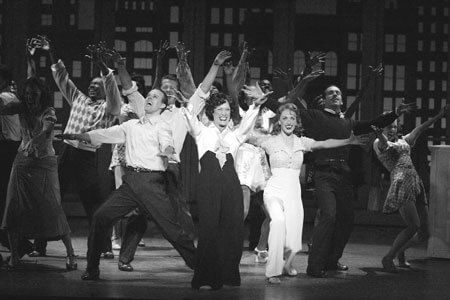VOLUME 3, ISSUE 306 | February 05 – 11, 2004
THEATER
NEVER GONNA DANCE
Broadhurst Theatre
235 W. 44 St.
Tue.-Sat. 8 p.m.; Wed., Sat. 2 p.m.;
Sun. 3 p.m., Through Feb. 15
$71.25-$101.25, 212 239 6200.
Tap Your Troubles Away
Fluffing requires its own skills, and this dance musical fluffs it just fine
On its surface, “Never Gonna Dance” is the kind of musical one sees just to have a good old, carefree time in the theater. Set in 1936 in the midst of the Depression, it’s representative of the silly, hopeful movie musicals of the time.
It’s also a pastiche musical in the vein of “My One and Only” and “Crazy for You,” and so if you like that kind of thing, you’re going to adore this show.
I happen to be in the adoring camp, as there’s nothing quite as lovely for dispelling the winter blues as a go-for-broke all-dancing, all-singing show complete with predictable plot, cheesy jokes, lovely songs, and a cast so adept at evoking the period—and so talented overall.
What puts this show over the top is the extraordinary choreography by Jerry Mitchell who is one of Broadway’s smartest choreographers. Over the course of the evening, Mitchell builds one dance on the other, taking his inspiration from famous movie dancers (mostly Fred Astaire and Ginger Rogers) and creating dance movements that are as dramatic in their execution as the book of the show is silly and contrived. This is the same balance that Astaire demonstrated in “Swing Time” (on which “Tap” is based), “Top Hat,” and other classics in the genre.
It’s downright exhilarating to watch this expert dancing. Combined with the equally well conceived costumes by William Ivey Long and the sets that recall early Hollywood’s sound stages by Robin Wagner, the entire show is a treat from beginning to end.
Of course, willingly suspending disbelief enhances this storyline, but doing so is only part of the fun. Lucky Garnett is a two-bit vaudeville dancer, who’s about to get married in Punxsutawney, Pa––yes—home of the groundhog––but his father-in-law to be doesn’t want his daughter, Margaret, to marry a hoofer. Lucky promises to give up dancing, go to New York, and make his fortune (armed with his lucky quarter) and come back to marry Margaret.
Once he gets to New York, though, Lucky loses his quarter and searching for it leads him to Penny who works in a down-at-the-heels dance studio. (Get it––a luck penny?)
The two decide to enter an amateur dance contest hosted by Major Bowes––on the radio. There’s the obligatory comic subplot that puts the two leads’ sidekicks together, and a bit of quasi-dramatic tension from Spud and Velma, the couple competing with Lucky and Penny for the prize money.
Chekhov it ain’t, but no one in his or her right mind goes to a show like this expecting anything other than fluff. But it’s mighty fine fluff, thanks to the cast. As Lucky, Noah Racey is a suave and charming leading man and a singer who can put over the Jerome Kern numbers without ruffling his formal shirt. His easy charm and big smile work overtime, and his dancing is consistently brilliant. In a combination that few contemporary leading men can carry off, Racey’s style looks effortless.
Nancy Lemanager who plays Penny, with the slightly brassy New York girl stock character down to every swallowed vowel, complements Racey. At the same time, Lemanager is bright and funny, easily handling songs like “I’m Old Fashioned,” with the kind of sweetness that never turns sugary. She’s terrific.
Karen Ziemba plays Mabel Pritt—a second banana name if ever there was one. Mabel, though, is full of “pep,” as they said at the time. She’s an experienced girl without being a “bad girl,” and Ziemba brings a worldly twinkle to the role. She opens her pipes and reminds us what a sensational performer she is in her second act number, “I Got Love.” Paired with Peter Gerety, as Alfred J. Morgenthal, the impoverished broker busted by the stock market crash, Ziemba shines.
Thanks to Lucky’s lucky quarter and the total abandonment of naturalistic playwriting, Morgenthal ends up wealthy at the end.
As Spud and Velma, Eugene Fleming and Deidre Goodwin are dazzling. Both are top-notch singers and dancers and they’re what producers called the “specialty act.” Their accompaniment dances to “She Didn’t Say Yes” and “I’ll Be Hard to Handle” are comical and showcase their individual and collective talents perfectly.
The score is a collection of songs by Jerome Kern and his various collaborators. In addition to the songs mentioned, there are “Pick Yourself Up,” “The Way You Look Tonight,” and “A Fine Romance.” Book writer Jeffrey Hatcher has managed to weave it all together in a way that is consistently engaging.
This is the kind of musical one goes to in order to take one’s mind off weighty affairs and troubles. It’s a formula that worked again and again in the 1930s, and it sure doesn’t hurt today. You can pick up your worries when you leave the theater, but after having this much fun, they might not seem so burdensome.
Give it a shot—it won’t hurt.



































